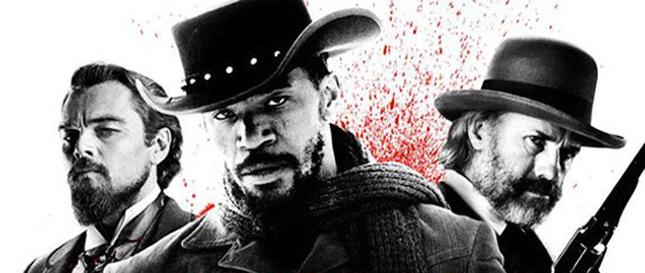That Quentin Tarantino. He’s such a cut-up.
After bowdlerizing and generally having a grand old time with the Holocaust in his fantasy-action-god-knows-what-genre movie “Inglourious Basterds,” Tarantino, never a director to cringe from any subject, now matter how low or high, has tackled slavery and race in America to unhinge our sense of history further and to bolster the survival of the mashup genre.
And what a mess this mashup of a movie called “Django Unchained” is. And I say this with all due respect to the hordes of critics and way-cool Tarantino fans who have sung the praises of the movie, while duly noting the director’s gleeful use of blood-spurting violence and the n-word.
I think Tarantino is a brilliant director who bleeds cinema, talks cineaste and has probably seen every bad B movie ever made. Here’s a brilliant guy who, unfortunately, has never made a brilliant movie. He’s made brilliant sequences, scenes, segments and such, but never a movie that amounted to something that you could hang a feeling or a revolution on. If they gave Oscars for parts of movies, why give him one for best performance by an actress, playing a character under the influence of heroin (“Pulp Fiction”), best use of gangster yakety-yak (“Reservoir Dogs”), most suspenseful, tense ten or 15 minutes to open a movie for “Inglourious Basterds,” best performance by a German actor in an 1848 American setting (Christoph Waltz in “Django Unchained”), best dissertation on the origin of the name Brunhilde and how it came to be bestowed on slave woman (“Django Unchained”).
Tarantino has been praised for tackling such a serious subject as slavery—and presenting it realistically and gruesomely—horrible scenes of whippings and Mandingo fighting, for instance. But you know what? The cruelties practiced by slaveowners and overseers are no secret. It seems to me that we’re supposed to be edified by these scenes, and horrified, and educated, but should we also be entertained? I know it’s exhilarating to see those awful guys (and one woman) to be slaughtered by the righteous Django in the film’s climax, but should this be quite so much fun? You can kill Adolf Hitler in a movie, but it’s harder to end slavery. Django said it much better when offered to be a bounty’s hunter’s partner: “Killing white people and getting paid for it? What’s not to like?” That stings, and it’s sharper than the literal-minded slaughter of the guilty at the end, especially the way Django metes out justice the hard way against Samuel Jackson’s embittered, viscous Uncle Tom character. It almost makes you wonder how Django would have handled Mammy, the stubbornly and blindly loyal slave of Scarlett O’Hara.
It seems to me that Tarantino can’t help showing off, being wickedly funny or showing how smart he is. That doesn’t make “Django Unchained” profound, it makes it at bottom a little silly, which undermines the seriousness the subject deserves. I don’t mean Steven Spielberg serious—although Spielberg, a frequent target of the cool, hip critical world, gets to the heart of the matter in “Lincoln”—but serious in the manner of respecting the audience’s intelligence instead of indulging your own smartness
It should be added that all the actors—Jamie Foxx as the hero, Waltz as his German partner, Jackson, Leonardo DiCaprio in a relishing turn as the corrupt, effete owner of the plantation named Candiland, and Kerry Washington as the heroine, are pitch-perfect, and the writing as always, is sharp. What “Django Unchained” lacks, and what most if not all of of Tarantino’s movies lack, is size, which is to say greatness. Nobody—except smart-ass critics—loves a smart ass.


